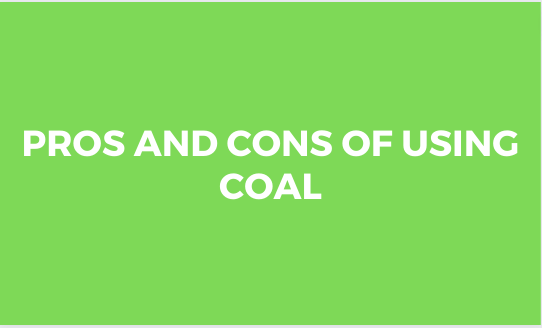Coal has long been a significant source of energy due to its abundance and affordability; however, its use comes with both advantages and disadvantages. Here are pros and cons of using coal:
Pros:
- Abundant and Widely Available: Coal reserves are plentiful in many regions, ensuring a stable energy supply.
- Cost-Effective: Coal is relatively inexpensive compared to other energy sources, making it economically attractive.
- Reliable and Predictable: Coal-fired power plants provide a steady and reliable source of electricity.
- Energy Security: Countries with ample coal resources can reduce dependence on imported energy.
- Job Creation: The coal industry supports employment in mining, transportation, and power generation.
- Electricity Generation: Coal power plants can generate large amounts of electricity to meet growing energy demands.
- Technological Advancements: Ongoing research has led to cleaner and more efficient coal technologies, reducing environmental impacts.
- Infrastructure in Place: Many countries have existing coal infrastructure, making it easier to utilize coal for energy production.
- Baseload Power: Coal power plants can operate continuously, providing a stable base of power to the grid.
- Fuel Diversity: Coal adds to the mix of energy sources, diversifying the energy portfolio and reducing dependence on a single source.
- Supporting Local Economies: Coal mining communities often rely on the industry for economic stability.
- Historical Significance: Coal has played a vital role in the industrial development of many countries.
- Global Availability: Coal resources are spread across the world, reducing geopolitical energy dependencies.
- Flexible Power Generation: Coal plants can ramp up or down quickly to respond to fluctuations in electricity demand.
- Infrastructure Utilization: Utilizing existing coal infrastructure can maximize the use of sunk investments.
- Technology Transfer: Advances in coal technology can be shared with developing nations to support their energy needs.
- Coke Production: Coal is used in the production of coke, a vital ingredient in steelmaking.
- Job Stability: Coal mining jobs can provide long-term employment opportunities for local communities.
- Reliable Baseload for Grid Stability: Coal power plants contribute to the stability and reliability of the electrical grid.
- Energy Independence: Countries with significant coal reserves can reduce reliance on imported energy sources.
Cons:
- Environmental Pollution: Burning coal releases greenhouse gases, contributing to climate change and air pollution.
- Health Impacts: Coal combustion emits harmful pollutants that can have adverse effects on human health.
- Non-Renewable: Coal is a finite resource that cannot be replenished on human timescales.
- Land and Water Degradation: Coal mining can cause deforestation, soil erosion, and water pollution.
- Ecosystem Destruction: Coal extraction and processing can harm local ecosystems and biodiversity.
- Coal Ash Disposal: Proper disposal of coal ash, a byproduct of coal combustion, can pose environmental challenges.
- Water Consumption: Coal power plants require significant amounts of water for cooling and steam generation.
- Methane Emissions: Coal mining and storage can release methane, a potent greenhouse gas.
- Carbon Capture Challenges: Implementing carbon capture and storage technologies for coal plants can be costly and technologically complex.
- Air Quality Impact: Coal combustion releases pollutants that contribute to smog and poor air quality.
- Water Scarcity Concerns: Coal extraction and processing can exacerbate water scarcity in water-stressed regions.
- Greenhouse Gas Intensity: Coal has a high carbon content, resulting in significant CO2 emissions per unit of energy produced.
- Negative Climate Impact: Coal is a major contributor to global carbon emissions and climate change.
- Coal Transportation Risks: Transporting coal via trains or ships can pose safety and environmental risks.
- Mining Accidents: Coal mining carries inherent risks of accidents, injuries, and fatalities for workers.
- Coal Seam Fires: Underground coal fires can release harmful gases and persist for long periods.
- Resettlement and Displacement: Coal mining operations can lead to the displacement of local communities.
- Aesthetic Impact: Coal mining can alter the landscape, affecting the visual appeal of the surroundings.
- Decommissioning Challenges: Properly decommissioning coal power plants requires careful planning and resource allocation.
- Transition Challenges: Transitioning away from coal can pose economic and social challenges for coal-dependent regions.
Pros
- Abundant and Widely Available
- Cost-Effective
- Reliable and Predictable
- Energy Security
- Job Creation
- Electricity Generation
- Technological Advancements
- Infrastructure in Place
- Baseload Power
- Fuel Diversity
- Supporting Local Economies
- Historical Significance
- Global Availability
- Flexible Power Generation
- Infrastructure Utilization
- Technology Transfer
- Coke Production
- Job Stability
- Reliable Baseload for Grid Stability
- Energy Independence
Cons
- Environmental Pollution
- Health Impacts
- Non-Renewable
- Land and Water Degradation
- Ecosystem Destruction
- Coal Ash Disposal
- Water Consumption
- Methane Emissions
- Carbon Capture Challenges
- Air Quality Impact
- Water Scarcity Concerns
- Greenhouse Gas Intensity
- Negative Climate Impact
- Coal Transportation Risks
- Mining Accidents
- Coal Seam Fires
- Resettlement and Displacement
- Aesthetic Impact
- Decommissioning Challenges
- Transition Challenges



